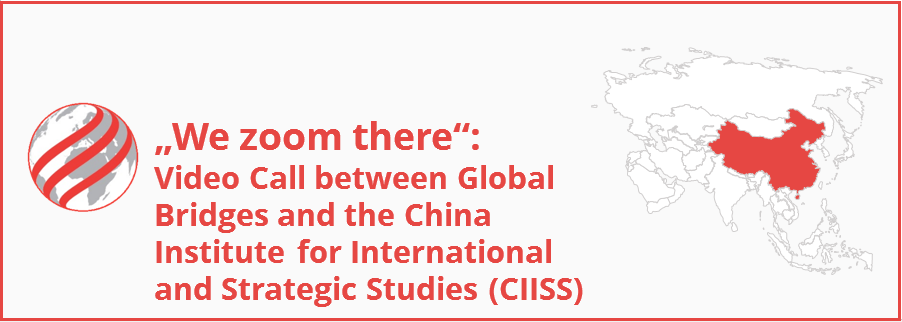Video Call between Global Bridges and the China Institute for International and Strategic Studies (CIISS)
Thursday, October 15, 2020
After the First Chinese-German Video Symposium on September 19, the Chinese side wanted to discuss the problems between Germany and China and China and the EU in a separate conference, ahead of the second video symposium in November. On the Chinese side, Maj. Gen. (ret.) XU Nanfeng, Vice Chairman of the CIISS as well as retired Senior Colonels CHEN Wei, BAI Zonglin, and YU Hanmin, all of whom are Senior Research Fellows at the CIISS, were present. On the German side, the guest speakers were Professor Dr. h.c. Wolfgang Ischinger, Chairman of the Munich Security Conference, and Jörg Wuttke, Vice President and Chief Representative of BASF in China as well as President of the European Chamber of Commerce in China. The debate was moderated by Dr. Hans Albrecht, Chairman of Global Bridges and Dr. Beate Lindemann, Executive Chairman of Global Bridges.
After the initial greetings, Wolfgang Ischinger introduced the topic, saying that German-Chinese relations are as important now as they have ever been. As Chairman of the Munich Security Conference, he lauded the productive participation of China at the conference in the past and stressed that the next conference would, despite COVID-19, be held in February 2021. Even though cooperation with China is substantial, there are a number of issues between China and the EU that have created division in recent years, according to Professor Ischinger. Foremost among these are human rights concerns, especially in connection to the introduction of the Hongkong Security Laws. Also, there have been concerns over the involvement of Chinese companies like Huawei in the development of a 5G network.
Wolfgang Ischinger noted that due to these differences, the perspective on China in Germany and the EU has changed. Once viewed as a partner and promising export market, China is now officially seen as a systemic rival by the German government and the EU Commission. This increases the need for open dialogue to overcome the difficulties in the European-Chinese relationship.
Interjecting briefly, Maj. Gen. (ret.) XU Nanfeng thanked Prof. Ischinger for his frank and concise evaluation and noted, that since Germany has taken over as the EU chairman, there have been initiatives to change policy towards China.
Jörg Wuttke, having lived in China for more than 30 years, stressed the important economic ties between the EU and China. For the first time, China is a bigger trading partner of the EU than the US, and there is still much potential of China as an export market for the EU. He also noted that European companies were eager to stay in China, even more so than in earlier years. The large investments by companies such as BASF show the willingness to form closer economic ties to China.
On the other hand, Mr. Wuttke noted the pressure German companies were under at home for operating in China. For example, as the largest investor in Xinjiang, BASF is criticised at home due to the human rights issues in the region. While in 2002 37% of Germans viewed China unfavourably, that number has increased to 71% in 2020. This complicates negotiations between the EU and China, and although Mr. Wuttke was hopeful for an EU-China investment treaty, he doubted that all 27 EU countries, especially Sweden and the Czech Republic, would agree to one.
Senior Colonel (ret.) CHEN Wei thanked the previous speakers for their evaluation of the situation and asked Prof. Ischinger, whether Germany views China more like a partner, a competitor, or a systemic rival and wondered, what a potential outcome for the special EU summit on EU-China relations in Berlin could be. Prof. Ischinger replied, that everything depended on China, as there is no clear position on China that is shared by all EU member states. Germany, according to him, is aware of the interdependence of China and the EU, but a level playing field, ensured by treaties is needed. In this respect, he regretted that the EU-China summit in Leipzig had to be postponed due to the COVID-19 pandemic. Conclusively, Prof. Ischinger recommended that China should do the opposite of the US: it should not look at the EU as a foe. However, a prerequisite for closer ties with Europe would be, that China treats Europe as a partner at eye level and acknowledges the problems in the relationship.
Chen consequently said, that if the EU-China relationship was truly decided by China’s behaviour, he was optimistic. He noted, however, that the relationship would also be affected by the upcoming US presidential elections and asked Prof. Ischinger, how it would be affected by both candidates and who he hoped would become president.
Wolfgang Ischinger answered that the tensions the EU and China have had with President Trump would not simply disappear, even if Biden, whom he preferred, was to be elected President. Most Americans see China as a rival, which compels policymakers in the US to take a tough stance. With respect to the EU, Prof. Ischinger stated that much of the trust that was between the EU and the US has been lost in the last years.
Chen then asked Jörg Wuttke, whether an agreement requires full consensus by all member states in the EU. Mr. Wuttke replied that one country could derail the entire negotiations, like Cyprus did in the EU-Canada trade talks. Especially the Eastern European countries were disappointed with the otherwise promising Belt and Road Initiative. Finally, he wondered why European exports to China were decreasing, while the US exports to China were growing, even amidst a trade war.
Dr. Albrecht concluded the video conference by stressing the common problems both China and Germany face, like climate control. In light of this, the countries should not see each other as opponents.


